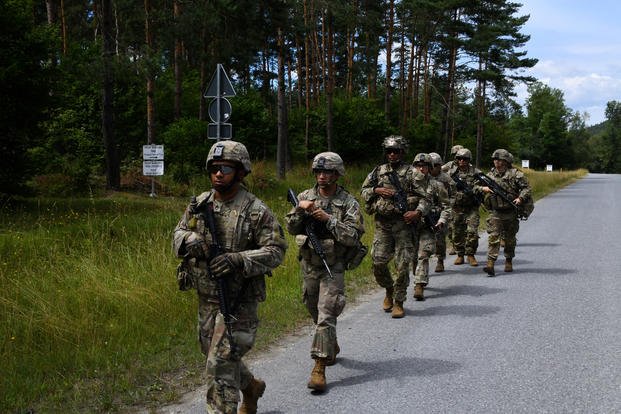John Richard Cookson is a fellow at Defense Priorities. He previously worked for the Chicago Council on Global Affairs, CNN and The National Interest.
On Friday, President Joe Biden is expected to bring his "America is back" message to a virtual session of the Munich Security Conference. But America is not back, as such. It never really left Europe.
The U.S. military presence on the continent, currently near 70,000 personnel, is more or less where it was four years ago and still in excess of what is needed.
Earlier this month, Biden announced that the Trump administration's uncompleted plan to withdraw 12,000 U.S. troops from Germany has been paused pending a review. The withdrawal should go forward, but not because it represents a substantial change -- in fact, the opposite.
Beneath the misleading headline, President Donald Trump's plan was minor, not at all worth the piqued reaction it received from some foreign policy professionals on both sides of the Atlantic. It should proceed as a way for the White House to show allies that a strong U.S. commitment to NATO is independent from the number of troops stationed in Europe.
What is in the plan? First off, 5,600 of the 12,000 troops in the planned drawdown would leave Germany but remain in Europe, with most going to Poland, Italy or Belgium. Moving some U.S. troops from Germany to allied countries bordering the country changes nothing in terms of overall European security.
Europe-wide security is what is important to consider when making deployment decisions, not the number of U.S. troops stationed in any one country at any one time. In all, the paused plan calls for reducing the number of permanent deployments in Europe by only 6,400 troops, which is less than 10% of the total personnel there now.
Moreover, many of the U.S. troops "coming home" on paper would in fact return to Europe, only on a rotational rather than a permanent basis. The planned redeployment of a couple thousand troops -- set against the tens of thousands staying in Europe and the hundreds of thousands already drawn down since the Cold War -- is mere tinkering, nothing decisive or even meaningful in terms of security.
Many Americans seem to grasp what some in Washington have not. U.S. support for NATO, and for the Article 5 obligation at its core, does not stand or fall over a few thousand troops stationed abroad. According to the 2020 Chicago Council Survey, a majority of Americans say they support NATO. A majority (57%) also favor the Trump administration's decision to decrease the number of U.S. troops in Germany, and an additional 16% favor removing U.S. troops from the country altogether.
The substance of the withdrawal proposal needs to be separated from the man who proposed it.
Trump was sharply criticized for his behavior toward allies, and much of it was well earned. His relationship with German Chancellor Angela Merkel was reportedly so frosty that some commentators suggest a straight line between it and the decision to remove troops from Germany. That may be true, but it does not pertain to the question before the Biden administration today in Europe, which is about security -- not personalities.
Divorced from the messenger, the message stands: Fewer U.S. troops are needed in Europe because threats there are limited and diminishing. Russia is the only country that could threaten the territory of NATO allies, but Moscow is not what it once was.
Russia's economy is feeble, and its frustrated citizens have taken to the streets in protest. Talk of significant cuts to defense spending is rife as the Kremlin seeks to channel more spending into social programs ahead of elections later this year. Russia is simply not poised to mount a large-scale territorial conquest of Europe. Moreover, the misdeeds the Kremlin does perpetrate, below the threshold of provoking war, are not deterred by plus or minus a few thousand U.S. ground troops in Europe. Because the Cold War-era raison d'être for NATO no longer exists, the U.S. no longer needs to garrison Europe so heavily.
Not only is much of Europe secure, but many NATO allies are wealthy and capable of spending more on their defense. Removing some U.S. troops might encourage European allies to spend more, making the alliance stronger overall. Especially in the near term, unpausing and finishing the minor troop withdrawal ahead of the German elections in September could help make defense spending a more prominent campaign issue.
However, if Biden spikes the paused troop-withdrawal plan before the elections, German politicians -- confident in continuing to free ride on Washington -- might either ignore the issue or argue to cut Germany's defense spending even further. Spiking the plan could also make any future troop redeployments much more difficult politically, keeping U.S. troop numbers in Europe fixed for no other reason than inertia.
Finally, even if European allies are slow to spend more on defense as the U.S. withdraws some troops, the reductions would still free up American resources over time for higher priorities, such as spending at home or beefing up its military presence elsewhere.
-- The opinions expressed in this op-ed are those of the author and do not necessarily reflect the views of Military.com. If you would like to submit your own commentary, please send your article to opinions@military.com for consideration.














